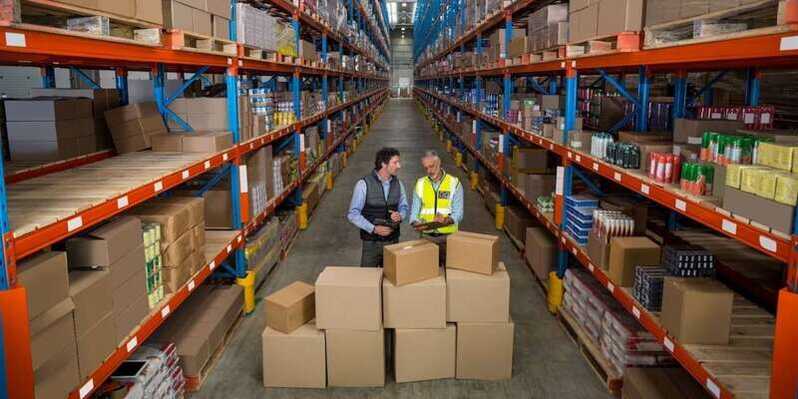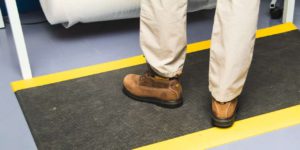Musculoskeletal disorders, known as MSDs by occupational medicine, are an inherent risk in a company’s logistics activity. Work-related accidents are twice as frequent in this sector as elsewhere, and it is often the back, the hands, the shoulders and the feet that are overworked among order pickers.There are, however, ways of avoiding these musculoskeletal risks and of making the work of these employees less dangerous for their health. What are the avenues of prevention to protect your order pickers effectively?
What risks can your order pickers endure?
Work-related accidents or the arduousness of the tasks mean that your employees are exposed to occupational risks.
In the European Union, 28% of workers employed in the transport sector suffer from back pain and 25% from muscular pains
.
So
- Pain, tingling, heat, cramps and stiffness are the main risks associated with MSDs.
- Intensive use of certain musculoskeletal regions, particularly during manual handling, can lead to serious injuries.
- There are also environmental constraints: draughts in the room, too much heat or too little temperature are also potential risks for your employees.
- Increased hearing fatigue and exposure to electromagnetic waves with the development of voice picking.
occupational accidents
What are the possible occupational accidents? They can be caused by problems related to the organisation of work: for example, there are risks related to the movement of people and trolleys that come from the configuration of the premises and the clutter of the space. This type of occupational accident can lead to musculoskeletal risks on various parts of the body, such as..
- Sprains, dislocations, joint problems
- Fractures, bruises, wounds.
- Falls from heavy packages.
- Dangerous products (chemical and/or biological).
physical strain
What are the physical risks for your employees? Make sure you think about this during the musculoskeletal risk assessment phase in your warehouse
- Vibrations: self-propelled truck.
- Risks of exposure to cold (for a cold store, for example).
- Carrying loads.
- Prolonged standing.
- Repetitive movements.
- Forced movements: spine, shoulder, elbow, wrist.

Quelles sont les actions pour prévenir des risques musculo-squelettiques ?
Comment faire pour protéger vos salariés des TMS? Quelles sont les pistes de prévention des risques pour vos préparateurs de commandes ?
Si tout commence bien sûr par le fait d’identifier les phases de préparation de commande les plus à risque (palettisation, gestes répétitifs…), il existe d’autres éléments cruciaux à prendre en main dès maintenant.
L’acquisition d’un matériel contre les risques musculo-squelettiques
Découvrez les outils qui peuvent vous aider à limiter l’apparition de TMS dans votre entrepôt, en assurant une activité professionnelle en toute ergonomie à vos préparateurs.
Un poste d’emballage optimisé
Le fait d’optimiser les postes d’emballage de vos opérateurs peut non seulement limiter la survenue de Troubles Musculo-Squelettiques, mais également accélérer la cadence de préparation de commande.
Prenez donc soin d’optimiser les postes d’em
- At the top: Position frequently used elements (flat packaging, small packaging parts, etc.), accessible by simply reaching down
- At operator height: Place the most frequently used elements, such as screens, the label printer, packaging tools (adhesive, cutter, etc.), and the dunnage roller
- Bottom: Place less frequently used items that don’t need to be gripped with your hands, such as dunnage machines or a secondary dunnage reel.
| Test the RAJA 3D packaging station configurator and create the best working conditions for your operators |
un tapis antifatigue pour les postes en station debout prolongée
Selon l’INRS, 49% des manutentionnaires travaillent en station debout plus de 20 heures par semaine. Or, cette station debout prolongée peut provoquer des TMS, notamment des douleurs musculaires et articulaires au niveau des membres inférieurs.
Les tapis antifatigue ont été conçus pour limiter ces douleurs, en facilitant la circulation sanguine, l’absorption des chocs et la réduction de la fatigue en station debout. Ils incitent en effet les opérateurs à maintenir leurs pieds en mouvement.
Disponibles sous forme de tapis pleins ou de dalles imbricables, ils sont simples à installer, peuvent faire toute la différence en termes de prévention de TMS.
Le petit plus ? Installer un tabouret assis-debout ou un siège d’atelier sur chaque poste d’emballage, pour limiter la station debout prolongée à vos opérateurs.

Des engins de manutention adaptés aux besoins des opérateurs
Bon nombre de TMS ou
.jpg) |
Constant level trolleys adjust the height at which goods and parcels are placed according to their weight, so that products always remain at the right height, reducing the need to bend down to pick them up. |
.jpg) |
Rolls are useful for loading parcels onto trucks at the very end of the logistics chain. |
.jpg) |
Pallet trucks help your operators to move pallets without overtaxing their bodies. Manual or electric, they are available in fairly affordable price ranges (around €300 for the entry level), and represent a worthwhile ROI investment as they limit the occurrence of RSI. |
| To find out how to choose your pallet truck, depending on the goods to be transported, the desired lifting height, or the environment of your warehouse, consult our short guide. |
a wrapping machine to prevent MSDs linked to manual palletising
One of the most frequent MSDs in the warehouse is that affecting the rotator cuff, during manual palletising. Fortunately, wrapping machines or robots can take over this logistical activity, and avoid over-stressing your operators’ shoulders. Setting up
a medical check-up
Regular medical check-ups are absolutely essential for jobs as physical as order pickers. The doctor can thus check their state of health in the workplace and sound the alarm in the event of any serious problems.Please note: first of all, it is important to have a medical check-up on recruitment, and then one every two years, to ensure the health and safety of your employees. During the medical check-up, it is necessary
- Your employee’s ability to carry loads in excess of 55kg – note that a load cannot be above 105kg (25kg for women).
- That a clinical examination has been carried out to check the professional capacity of your employees and that no disorders have been detected (pain, discomfort, etc.).
to
prevent musculoskeletal disorders in the warehouse, there is nothing like training your team leaders and operators in key gestures! By doing so, you will not only improve their working conditions, but also the employee experience of your company. Need to train your teams? RAJA, in partnership with an organisation specialising in health prevention, offers two anti-MSD training courses
- Gestures and postures” trainingthe RAJA Packaging Workbench, which trains participants over 8 hours in the reflexes and gestures to adopt in handling loads and the ergonomics of their workstation
- Muscle Awakening” trainingthis 12-hour course enables you to implement a muscular warm-up adapted to the working conditions in your warehouse, to reduce the potential disorders and pain suffered by your operators
led by qualified osteopaths or trainers specialised in musculoskeletal disorders, these courses are tailor-made to your specific needs and can be held anywhere in France. cta id=’98c73fc2-5dfe-4f9f-88a2-0046cdcb8bd3′]
Preventive actions to be
implemented It is possible to limit MSDs through preventive or organisational actions in the warehouse
- Arrange the storage areas to facilitate access and guarantee the safety of employees at work.
- Use materials adapted to the goods (weight, shape, volume).
- Increased monitoring of potential occupational disease in the warehouse.
- Create definedcirculation and storageareas.
- Establish traffic rules.
- Maintenance of circulation areas.
- Inspecting shelves to anticipate falling packages.
- Replacing equipment in poor condition, such as pallets.
- Limiting the weight of incoming and outgoing goods packages.
- Preventive training on the correct gestures and postures to adopt at work.
- Introduction of longer recovery times.
the risks to your employees will be limited.Risks can also be reduced by making the right managerial decisions: threshold bonuses, for example, should be avoided, as employees will be overstretching their actual production capacity.3 key points to remember
- The job of an order picker requires a lot of physical effort and constant stress on fragile areas of the body: this is how MSDs (musculoskeletal disorders) arise, which can cause serious injuries to your employees.
- The musculoskeletal risks faced by an order picker are linked to the work environment, accidents at work, organisational problems and the arduousness of the tasks.
- However, these risks can be avoided by very precise prevention of the disorders: regular medical check-ups, active prevention within the warehouses on the right gestures to adopt, but also by good maintenance of the equipment and an efficient logistic organisation.















